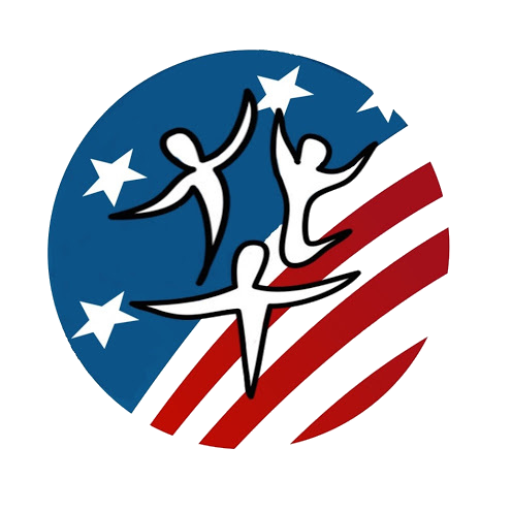Prevention and Intervention of Bullying
On Apr. 14, 2024, hosted by WizChinese/PACPC and sponsored by the Vincent V.C. Woo Memorial Foundation, the 7th session of the Mental Health Lecture Series “Bullying ” was presented by Steven Sust , MD, Child and Adolescent Psychiatrist, Stanford University
Strengths and Challenges of Asian Parenting Styles
On March 12, a Sunday afternoon from 2:30 to 3:30, WizChinese’s Palo Alto Chinese Parents’ Club (PACPC) held a Zoom session about Asian parenting styles of the “Pressure and Emotional Management” series with 40+ attendees. Stanford University Assistant Professor and Child and Adult Psychiatrist Dr. Xie Yuhuan led the webinar, introducing how parent-child relationships affect children’s physical and mental health, the strengths and challenges specifically of Chinese parenting, challenges faced by immigrant families, and advice on how to develop parenting styles that best fit one’s child’s needs. Dr. Xie Yuhuan advised about understanding your child’s personality, strengths, weaknesses, and observing what their developmental needs are. She emphasized the importance of playfulness, acceptance, curiosity, and empathy in the attitudes of parents toward children.
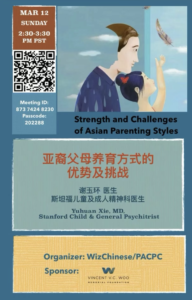
Mindful Parenting
On February 12, a Sunday afternoon from 2:30 to 3:30, WizChinese’s Palo Alto Chinese Parents’ Club (PACPC) held the 7th Zoom session about mindful parenting of the “Pressure and Emotional Management” series with 61 attendees. Stanford faculty Dr. Hui Qi Tong led the meeting, discussing the importance and elements of mindfulness and mental health exercises, particularly for parents. She drew from Chinese traditional poetry to communicate tenets of mindfulness, and introduced her mindful parenting course in Chinese at the Stanford Center for Integrative Medicine.
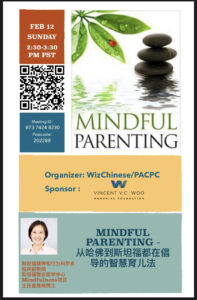
Powered By EmbedPress
Sleep
On October 30, a Sunday afternoon from 2:30 to 3:30, WizChinese’s Palo Alto Chinese Parents’ Club (PACPC) held the sixth session of the Mental Health Lecture Series titled “Sleeping” with 48 attendees. Psychologist and sleep specialist Dr. Yishan Xu, founder of Mind & Body Garden Psychology Inc., spoke about ways to improve sleep. She presented about cognitive behavioral therapy for insomnia (CBT-I) and other ways to both identify sleeping problems and address them. Ranging from discussing distressing techniques, meditation practices, reducing simulation, to routine habits after waking up, Xu emphasized the importance of listening to one’s body signals and trusting one’s body and to take care of one’s mental state in relation to sleep.
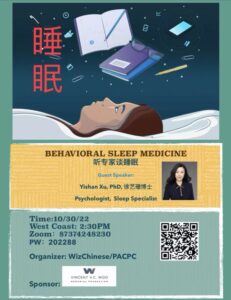
Mental Health Care
On September 25, a Sunday afternoon from 2:30 to 3:30, WizChinese’s Palo Alto Chinese Parents’ Club (PACPC) held the fifth session about parent-child conversations of the “Pressure and Emotional Management” series with around 40+ attendees. Dr. Huiqiong (Joan) Deng, Dr. Stacy Lin, and Dr. Rona Hu led a meeting about the process of utilizing resources and certain behavioral recommendations for mental health care, with Dr. Lin presenting a segment detailing the benefits and steps to starting therapy, specific therapy providers, recommending organizations like Asian American Mental Health Collective and Psychology Today for Chinese language therapists, and educating about appropriate parental responses to children’s mental health concerns.
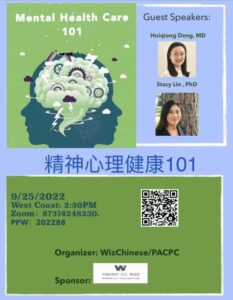
Electronics Addiction
On August 28, a Sunday afternoon from 2:30 to 3:30, WizChinese’s Palo Alto Chinese Parents’ Club (PACPC) held the fourth session about “Electronics Addiction” of the “Pressure and Emotional Management” series with around 40+ attendees. Dr. Huiqiong (Joan) Deng and Dr. Rona Hu led a meeting about gaming disorder and Internet addiction, especially for parents to supervise their children by understanding their psychological needs and setting boundaries when overseeing technology use. They discussed the importance of digital nutrition and diet, limiting screen use, and encouraging healthy habits for teenagers and children to learn responsible technology use, and preventing Internet addiction’s causes of mental health illnesses and disorders.
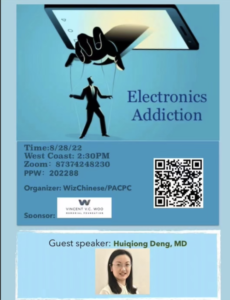
Addiction Support Group
On July 10, a Sunday afternoon from 2:30 to 4:15, WizChinese’s Palo Alto Chinese Parents’ Club (PACPC) held the third support group meeting of their “Pressure and Emotional Management” series. With twelve attendees, Dr. Rona Hu led a discussion following up on the previous Zoom meeting two weeks ago about addiction.
Dr. Hu kicked off the meeting by recommending a book called Dopamine Nation by Anna Lembke. The book discusses the many types of addiction and helps the reader understand the significance of addiction. Dr. Hu also restated that dopamine, the reward hormone, is a major factor behind addiction. She said that although drugs like nicotine and cannabis don’t directly invoke dopamine, the reactions eventually lead to the chemical. Dr. Hu continued on to say that there are two parts of addiction: the stimulation of dopamine and an escape from hardships. She also stated that the risk behind and activity plays a part in addiction, with low risk activities being easier to become addicted to. Another motivation for addiction that Dr. Hu mentioned was social anxiety, which has become more common recently. She also said that anyone is prone to addiction, even successful people. She went on to explain the major signs of addiction which are the prioritization of the activity, loss of sleep due to the activity, and attempts to hide the addiction from others. Dr. Hu also explained that understanding and communication were better than prevention or cutoff from the addiction. She said that teens fear social harm more than physical harm and thus can be peer pressured into addiction. After that, Dr. Hu talked about drug addiction, including addiction to nicotine and marijuana. She mentioned that even though children smoking is frowned upon children can find vapes relatively easily. Dr. Hu said that a good way to show the consequences of addiction is to use visual evidence. For example, instead of saying “smoking will give you cancer,” showing an image of the effects of smoking for a long time will have a much greater impact.
Addiction
On June 26, a Sunday afternoon from 2:30 to 3:30, WizChinese’s Palo Alto Chinese Parents’ Club (PACPC) hosted the third Zoom meeting of their “Pressure and Emotional Management” series. Dr. Rona Hu and Dr. Huiqiong (Joan) Deng held a presentation about addiction with 22 attendees.
The meeting started with discussion about personal experiences with addiction, namely with phones, and how to deal with it. Dr. Hu emphasized the importance of understanding the reasons behind addiction. She explained that an area in the brain, th e nucleus accumbens, controls the release of dopamine. The two baselines of addiction, as stated by Dr. Hu, are a spike in dopamine and the reliability of said spike. She also mentioned that doctors assess addiction levels in different ways. For children, performance and social interactions at school are used, while an adult’s social life at work and with family is evaluated. Dr. Hu suggested gradually replacing an addicting activity with another activity that isn’t addicting but still rewarding, rather than a non-rewarding activity such as studying. Dr. Deng described two types of addiction: chemical and behavioral. Chemical addiction includes addiction to alcohol, smoking, and other substances that ultimately affect dopamine. Behavioral addiction encompasses addictions such as video games, social media, and shopping. Dr. Deng and Dr. Hu both stressed that family involvement is critical in addiction treatment, and that medications are available for chemical addiction. In addition, although there is no medicine to directly treat behavioral addiction, side effects of the addiction such as depression and anxiety can be treated with meds. In the next support group, strategies regarding combating addiction will be discussed.
e nucleus accumbens, controls the release of dopamine. The two baselines of addiction, as stated by Dr. Hu, are a spike in dopamine and the reliability of said spike. She also mentioned that doctors assess addiction levels in different ways. For children, performance and social interactions at school are used, while an adult’s social life at work and with family is evaluated. Dr. Hu suggested gradually replacing an addicting activity with another activity that isn’t addicting but still rewarding, rather than a non-rewarding activity such as studying. Dr. Deng described two types of addiction: chemical and behavioral. Chemical addiction includes addiction to alcohol, smoking, and other substances that ultimately affect dopamine. Behavioral addiction encompasses addictions such as video games, social media, and shopping. Dr. Deng and Dr. Hu both stressed that family involvement is critical in addiction treatment, and that medications are available for chemical addiction. In addition, although there is no medicine to directly treat behavioral addiction, side effects of the addiction such as depression and anxiety can be treated with meds. In the next support group, strategies regarding combating addiction will be discussed.
Social Anxiety and Communication
On June 12, a Sunday afternoon from 2:30 to 3:30, WizChinese’s Palo Alto Chinese Parents’ Club (PACPC) held the second support group meeting of their “Pressure and Emotional Management” series. With ten attendees, Dr. Rona Hu, Dr. Catherine Shir, and Dr. Flora Ma led a discussion following up on the previous Zoom meeting last week about social anxiety. 
The doctors covered how social anxiety disorder can be both genetic or acquired, and has been amplified amongst children due to the pandemic’s isolating times. Treatments including cognitive behavioural therapy (CBT), medications, and parents’ guidance are important and beneficial. Compassionate listening through being observant, affirming your kid, and asking open ended questions while also giving your child space and time when they need it are significant ways to connect with your child. Being open, wanting to help your child feel safe and to make room for your child to make mistakes are especially important as well. When your child pushes you away and does not want to talk to you, the doctors recommended being action-oriented and doing things together rather than talking together, taking notes of the opinions your child shares, whether positive or negative, and bringing out even the littlest pearls of communication. A growth mindset is crucial to any form of connection with your child, and while for Asians, perfection is the standard achieved through obedience and quietness, learning to open up and speak up are important to breaking the bamboo ceiling within the workplace.
mistakes are especially important as well. When your child pushes you away and does not want to talk to you, the doctors recommended being action-oriented and doing things together rather than talking together, taking notes of the opinions your child shares, whether positive or negative, and bringing out even the littlest pearls of communication. A growth mindset is crucial to any form of connection with your child, and while for Asians, perfection is the standard achieved through obedience and quietness, learning to open up and speak up are important to breaking the bamboo ceiling within the workplace.

Social Anxiety
On May 29, a Sunday afternoon from 2:30 to 3:30, WizChinese’s Palo Alto Chinese Parents’ Club (PACPC) held the second Zoom meeting of their “Pressure and Emotional Management” series. With 32 attendees, Dr. Catherine Shir, Dr. Flora Ma, and Dr. Rona Hu led a presentation about social anxiety.

They first discussed the effects of social anxiety, including higher risks of depression or substance abuse. They then characterized common symptoms of social anxiety disorder (SAD), including blushing, trembling, sweating, worrying about social interactions, and avoiding situations. The doctors then delved in on causes of social anxiety disorder, which consists of a combination of biological, personality, and social factors. Whether one has an overactive amygdala, a shy, timid, or withdrawn personality, experience over-parenting or a lack of parental warmth, or gone through childhood bullying are all potential causes of social anxiety disorder. Parents are especially important role models for children, and can help them manage anxiety through communication and support. Finally, the doctors discussed treatments for social anxiety disorder, including psychotherapy such as Cognitive Behavioural Therapy (CBT) and medical therapy, consisting of antidepressants such as SSRIs, B-blockers, and anti-anxiety medication. Studies show that combined therapy of CBT therapy and medication prove to be 81% effective. Dr. Catherine Shir shared an informative handout on social anxiety disorder:tinyurl.com/socialanxietychinese, as well as videos which links are https://youtu.be/CjJ8IIBHnV8, https://youtu.be/7pBgsNX7hqM, and https://youtu.be/r8tAy-a5GBk.
Mental Health Disorders

On May 15, a Sunday afternoon from 2:30 to 3:30, WizChinese’s Palo Alto Chinese Parents’ Club (PACPC) hosted the first support group following the first Zoom meeting of their “Pressure and Emotional Management” series. With eight parent attendees, Dr. Rona Hu and Dr. Huiqiong (Joan) Deng led a discussion centered around communication, primarily highlighting compassionate listening and the stages of grief.
Dr. Hu and Dr. Deng first covered mental health disorders such as schizophrenia and depression, underscoring perfectionism as a common root of depression among immigrants. Through answering parents’ questions and forming example scenarios, the doctors expressed main takeaways including the concept of shame in Asian communities, fixed versus growth mindsets, and receptive communication styles.

“The United States is a shameless country,” Dr. Hu said, emphasizing that asking questions and making mistakes, allowing yourself to feel the validity of your emotions, and recognizing that you may need to see a therapist are important steps to take for your mental health. Shame often accompanies the stigma against therapy and acknowledging mental health issues within the Asian community. Finding a therapist through tools such as Psychology Today, stress management (both doctors recommend working out), and self-care without
Cultural Disconnect
On April 24 on a Sunday afternoon, WizChinese’s Palo Alto Chinese Parents’ Club (PACPC) hosted the first meeting of their “Pressure and Emotional Management” series, with around fifty attendees. Funded by donations from the Vincent VC. Woo Memorial Foundation, the organization’s meetings are headed by Stanford faculty, composed of psychiatrists Dr. Rona Hu and Dr. Huiqiong (Joan) Deng and psychologist Dr. Flora Ma. The series includes twelve topics across an entire year, with both English and Mandarin spoken, and every two weeks, there will be an in-person support group where six to eight attendees can gain guidance and counsel from the three doctors regarding the previous online meeting’s issue. Sign-ups for the first support group on May 15 are here.
The PACPC organized the series to address the cultural disconnect within the Chinese community between children and parents, resulting in the stigmatization of mental health issues. With the combined cultural pressure of immigrant families and the extreme competitiveness of Bay Area schools, students bear the consequences of crippling expectations and lack of a support system. The transition from the isolation of remote learning to the jarringly supposed “normalcy” of in-person school adds a layer of additional weight to the already high levels of stress.
In what Dr. Hu characterized in the first meeting as acculturative family distancing, the deterioration in communication and deepened differences of cultural values across a gaping generational gap results in the distancing between immigrant parents and children. The series seeks to bridge the gulf between parent and child, through the de-stigmatization of mental health issues with Q&A, anecdotal examples, and support groups. The first session’s questions ranged from video game addiction to procrastination as a byproduct of perfectionism. The doctors will guide and encourage effective communication and compassionate listening, helping attendees navigate through cultural differences and the effects of trauma, and educating on the cultivation and importance of mental health and wellness. Ultimately, PACPC’s sessions aim to foster healthy perspectives about mental health and mental illness, addressing the long-needed healing and language of understanding within the Chinese American community.
